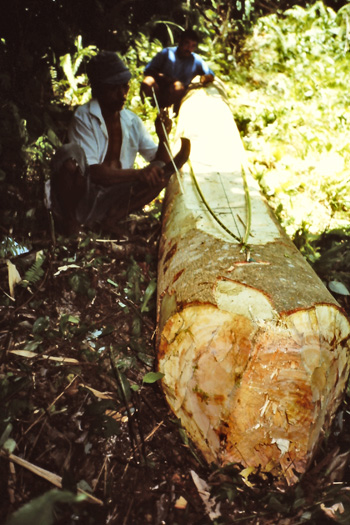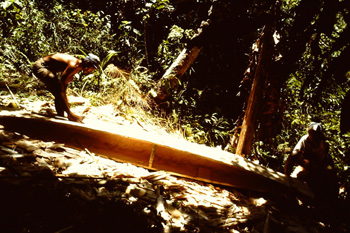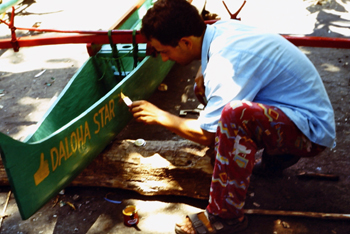By Bicycle to Kathmandu
Th
But something had happened along the road, and India crystallized it in some undefinable way. Arriving in Indonesia, although he was nearing his geographical goal, his intellectual goal was less clear. On a ferry in the Moluccas he befriended a local girl who directed him to her uncle in a village on the coast. Her uncle, she assured him, could help him build or acquire an out-rigger canoe, a long held dream of his. He also had an idea of finding out about what relationship existed between these sea going people and his beloved stars. Armed with a letter of introduction to a man who turned out never to be found, he went to the village and stayed for four months. There he got his canoe, the ‘Daloha Star' (transformed from tree into boat during his stay), and took it through the islands to New Guinea. By the time he got to Australia he knew that, other than chronologically, he was an anthropologist before he was an astronomer.
 |
 |
 |
|
| The tree that became the Daloha Star | Construction of the Daloha Star |
Götz Hoeppe's new track took him eventually to the Freie Universität Berlin, by way of editorships in astronomical and science magazines, and there he discovered he could be admitted to the Anthropology doctoral program despite lacking any previous degree in the field, leading to his PhD in 2002. Along the way he wrote a book about why the sky is blue. "I was intrigued by how differently a single phenomenon, accessible to all of mankind, has been interpreted and explained in various cultural and historical contexts." The book is now available in English under the title: Why the Sky is Blue: Discovering the Color of Life, (2007 Princeton/Oxford: Princeton University Press).
He chose to return to India for his field work. Once again he worked with boats, living with Hindu fisher folk in Kerala. Their knowledge of the stars was disappointing, but their engagement with the environment with which and in which they struggled to live was filled with meaning. Like many of us, Hoeppe also discovered that in the case of these Indian fishers engagement with the environment leads inevitably to political engagement as well.
Most recently Hoeppe has been examining the anthropology of astronomical work communities, uniting his two passions. Working with groups at observatories in Chile, Spain and elsewhere, his research looks at the nature of scientific enquiry as an intellectual and social activity, and at the conceptual status of the knowledge produced by these communities. Here at the College, Dr. Hoeppe will be teaching a variety of courses, concentrating on his interests in the interdisciplinary field of Science and Technology Studies (STS) which embraces scientific communities and the sociology of technology, as well as focusing on south India as a cultural region.
Hoeppe finds in anthropology a tool for making sense of the world. "Anthropology allows us to ask simple questions about complex things, and complex questions about simple things. It allows us to play with conceptual scale, trading complexity and simplicity back and forth to make sense of the world." Asked what insights he hopes to provide for students, he answers quickly: "How welcoming people are. They will let you into their world if you just ask. I want to incite an enthusiasm for discovery."
















